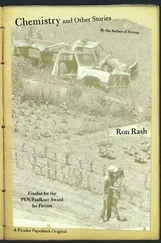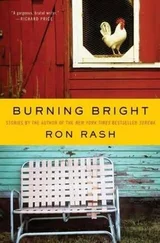It was upon this graveyard that Ross and his fellows gazed as the crew took its afternoon break. Rain had fallen off and on all day, and the men were wet and muddy and cold, the low gray sky adding to their somberness.
"The boy killed yesterday by that skidder boom," Ross said. "There was a hell of a thing. In the ground with dirt over him before he'd worked a week. A fellow used to could count on at least a pay stub before getting killed."
"Or live long enough to shave something besides peach fuzz off his chin," Henryson added. "That boy couldn't have been no more than sixteen."
"I expect before long they'll be fittin us for coffins ahead of time," Ross said. "You'll be planted in the ground before you've got a chance to stiffen up good."
"They ever find out who his people was?" Stewart asked. "That boy, I mean."
"No," Henryson said. "Jumped off one of them boxcars coming through so there ain't no telling. Wasn't nothing in his billfold but a picture. An older woman, probably his mama."
"Nothing writ on the back of it?" Stewart asked.
Henryson shook his head.
"Nary a word."
"Your people not knowing where you're buried," Stewart said somberly. "That's a terriblesome thing. There'll be never a flower nor teardrop touch his grave."
"I heard back in the Confederate War them soldiers pinned their names and where they was from on their uniforms," Henryson said. "Leastways their folks would know what happened to them."
Snipes, who'd been trying to unfold his sodden newspaper without tearing it, nodded in affirmation.
"It's the truth," he said. "That's how they knew where my grandpappy was buried. He got killed over in Tennessee fighting for the Lincolnites. They buried him right where he fell, but leastways his mama known where he was laid."
"Anything more on Harris in your newspaper?" Ross asked.
Snipes delicately set the wide wings of the paper onto his lap.
"There is. Says here the county coroner still has the brass to claim Harris' death was an accident, and that's after Editor Webb's article about the coroner being in the Pembertons' pocket."
"Makes you wonder who's next, don't it?" Henryson said.
"I'd not be surprised if Webb's moved up a spot or two with that editorial," Ross said. "I hope his house don't have a second floor. He might take the same tumble Harris did."
The men grew silent. Stewart unfolded the oilcloth that kept his Bible dry and began reading. Ross reached into his pocket and brought out his tobacco pouch. He removed his rolling papers and found them sodden as Snipes' newspaper. Henryson, who also was anticipating a cigarette, found his papers in the same condition.
"I was at least hoping my lungs might be warm and dry a minute," Ross complained.
"You'd think there'd be one little pleasure you could have, even on a day scawmy as this one," Henryson said. "You ain't got no rolling papers, do you Stewart?"
Stewart shook his head, not raising it from his Bible.
"How about a few pages of your Bible there?" Ross asked. "That'd make a right fine rolling paper."
Stewart looked up incredulously.
"It'd be sacrilegious do such a thing as that."
"I ain't asking for pages where something important's being said," Ross entreated. "I'm just asking for two pages where there's nothing but a bunch of so and so begot so and so. There ain't nothing to be missed there."
"It still don't seem right to me," Stewart said.
"I'd say it's exactly the Christian thing to do," Henryson countered, "helping out two miserable fellows who just want a smoke."
Stewart turned to Snipes.
"What do you think?"
"Well," Snipes said. "Your leading scholars has argued for years you'll find cause to do or not do most anything in that book, so I'm of a mind you got to pluck out the verse what trumps the rest of them."
"But which one's that?" Stewart asked.
"How about love thy neighbor," Henryson quickly volunteered.
Stewart bit his lower lip, deep in thought. Almost a minute passed before he opened the Bible and turned to Genesis. Stewart perused some pages before carefully tearing out two.
***
ON the following Sunday afternoon, the Pembertons mounted their horses for a ride to Shanty Mountain. Pemberton hadn't especially wanted to go, but as it was something Serena expected of him, he followed her to the barn. A sawyer had been killed by a snapped cable on Saturday morning, and as Pemberton and Serena made their way out of the camp, they encountered a funeral party proceeding toward the cemetery where an unfilled grave waited amid the stumps and slash. Leading the mourners was a youth wearing a black armband on his sleeve, in his hands a three-foot-tall oak cross. Two workers carrying the coffin came next, then a woman dressed in widow's weeds. Reverend Bolick and a dozen men and women followed. Two of the men walked with shovels leaned on their right shoulders, like military men at arms. Reverend Bolick carried his Bible, its black weight held skyward as if to deflect the sun's glare. Last came the women, bright-hued wildflowers in their hands. They moved through the blighted landscape slowly, looking as much like refugees as mourners.
Pemberton and Serena traveled west, the land rising quickly, the air stingier. An hour later the Pembertons made the last switchback in the trail and stood atop Shanty Mountain. They had not spoken the whole way. Serena and Pemberton looked over the valley and ridges and surveyed what timber remained.
"What Harris did, it was a needed reminder," Serena said, breaking their silence.
"A reminder of what?" Pemberton asked, still staring out at the valley.
"That others can make us vulnerable and the sooner such vulnerabilities are dealt with the better."
Pemberton met her eyes, and saw within Serena's gaze a stark unflinching certainty, as though to think otherwise was not just erroneous but unimaginable. She patted the Arabian's flank and moved off a few paces to check the depth a steel cable had bitten into a hickory stump. Pemberton looked down at the camp. The sun shone full on the train tracks, and the linked metal gleamed. Soon it would be time to pull up the rails, starting with the spurs and moving backward to undo what they'd bolted to the land.
Just remember you were warned , Mrs. Lowell had said that first night in Boston. Serena told him later she'd come only because she'd heard a timber man named Pemberton would be present at the party. She'd made a few inquiries to people in the business and decided it worth her time to meet him. After Mrs. Lowell had introduced them, Pemberton and Serena quickly left the others and talked on the verandah until midnight. Then she'd taken him to her apartment on Revere Street and he'd stayed until morning. Weren't you afraid that first evening I'd think you a strumpet with such boldness, he'd teased her later. No, she'd replied. I had more faith in us than that. Pemberton remembered how Serena had not spoken as she unlocked the apartment's door. She'd just stepped inside, leaving the door open. Serena had turned and fixed her eyes on him. Then, as now, they'd contained the utter certainty that Pemberton would follow her.
***
AS they rode back, the sun's last light embered on the western ridge tops. A breeze had cooled the air on Shanty, but as Pemberton and Serena made their descent the air became stagnant, humid. In the graveyard only one worker remained, methodically shoveling the last clods of dirt over the coffin.
Serena and Pemberton ate their supper in the back room and alone, as they always did now, then returned to the house. At eleven Pemberton went into the back room to prepare for bed. Serena followed him but did not begin to undress. Instead, she sat in a chair across the room, watching him intently.
Читать дальше












